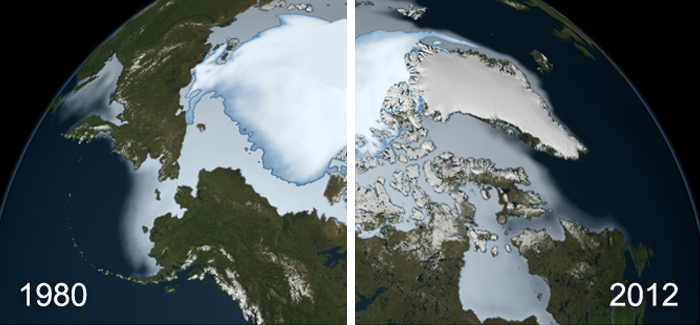
This still from an interactive NASA illustration shows how perennial sea ice has declined from 1980 to 2012. The bright white central mass shows the perennial sea ice while the larger light blue area shows the full extent of the winter sea ice including the average annual sea ice during the months of November, December, and January. (NASA/Goddard Scientific Visualization Studio)
What would Friedman do?
Surprises at the Institute of Politics panel on climate change.
You’d expect Milton Friedman, AM’33, to loom large over an event called “What Would Milton Friedman Do About Climate Change?”
Indeed, the Nobel laureate was a significant presence in both image and word. Of course there was a reference to his famous “no such thing as a free lunch” quote—and not in relation to the complimentary box lunches.
But there were surprises too. Here are five:
- The packed room could well have been empty. Bob Inglis, the event’s moderator and a former fellow at the Institute of Politics, which sponsored the event, originally wanted to call it “Free Enterprise Answers to Climate Change.” He credited the capacity crowd to the catchier title suggested by IOP executive director Steve Edwards.
- Economists can agree. According to panelists Steve Cicala, assistant professor at the University of Chicago Harris School of Public Policy, and Michael Greenstone, director of the Energy Policy Institute at Chicago and—naturally—the Milton Friedman Professor of Economics, while scientific consensus on the cause of climate change is near unanimous, economists are even more agreed on the solution. Greenstone said that economists, from Friedman disciples to “the most left-wing economist you can find,” support a tax on carbon emissions.
- “Promarket is not the same as probusiness.” The reason the market has not worked in regulating climate change, both men agreed, is because the price of carbon emissions right now is zero, giving companies the ability to pollute at no cost to themselves. Greenstone said there is no market for innovations in emissions reduction, which means the government would have to create one. And while Friedman sometimes balked at government intervention, Cicala argued that the “intervention” of government in this case would be to create the market and get out of the way. “It’s a fiction that markets exist on their own,” Greenstone said.
- Some Republicans do care about climate change. The surprise is not editorial bias. Cicala said Inglis, executive director of George Mason University’s Energy and Enterprise Initiative and a former Republican congressman from South Carolina, could not have picked a less popular issue among conservatives. Inglis’s institute seeks to bring together “RepublicEns”: Republicans concerned about energy issues. “It just has to be recognized as a conservative belief,” Inglis said.
- Maybe Friedman’s intent wasn’t so clear ... One audience member protested that a carbon tax would not only be anathema to Friedman but it would also violate the idea of economic efficiency as stated by the late Ronald Coase.
Video
The event discussion began with the showing of a clip from Milton Friedman’s 1979 appearance on the Phil Donahue Show.
